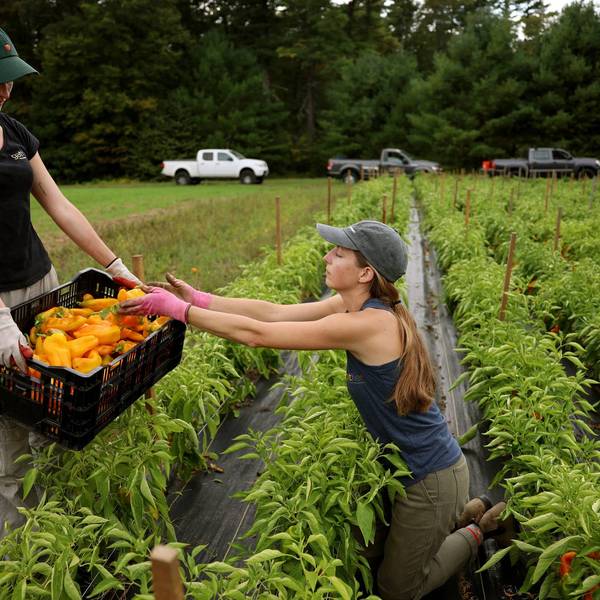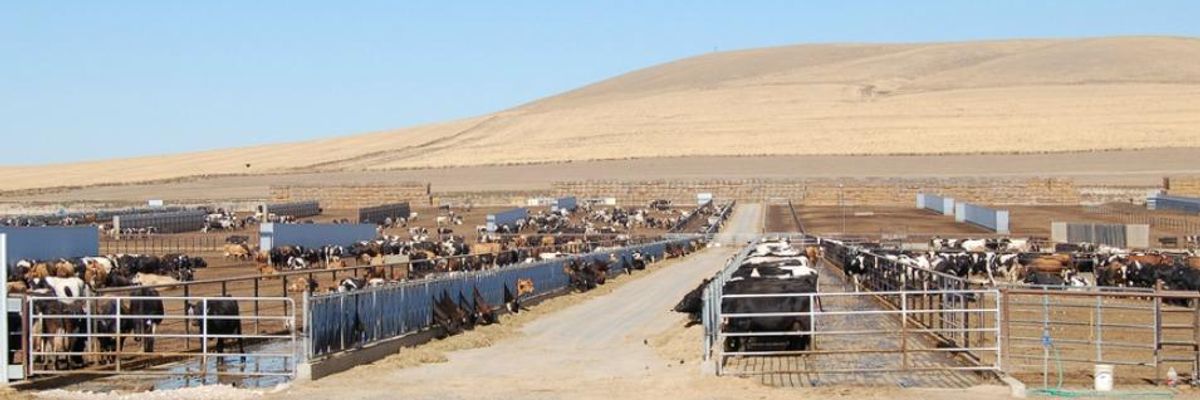Food & Water Watch on Tuesday released an analysis of the U.S. dairy farming industry—the climate and food justice group's third in-depth report on the economic costs of food monopolies—revealing how corporate consolidation has helped push small family farms out of business over the past two decades, while worsening the climate emergency.
In The Economic Cost of Food Monopolies: Dirty Dairy Racket, Food & Water Watch (FWW) explains how factors including the gutting of farm supply management policies and higher production costs have helped cause rapid consolidation in the dairy sector, with 70% of family-scale dairy farms shutting down between 1997 and 2007.
"Corporate consolidation is at the heart of our food system's dysfunction," said Rebecca Wolf, food policy analyst for FWW. "Corporate-directed policymaking is throwing America's dairy industry into crisis. Family-scale dairies are collapsing at an alarming rate, and those that manage to hang on face rising costs, negative returns, and mounting debt, while consumers are sold an illusion of pastoral, sustainable milk products."
Just 30% of U.S. milk is now produced at family farms, while 83% of milk sales are controlled by just three dairy cooperatives: Land O' Lakes, DFA, and California Dairies, Inc.
In addition to forcing small farms to shut down, the consolidation of the dairy production industry has "serious climate implications," said FWW, with the shift to factory farms resulting in the doubling of annual methane emissions from the sector between 1990 and 2020.
"We can and must build better, more sustainable systems that support people, communities, and the environment," the group tweeted.
FWW traced the loss of family-scale farms back to factors including the loss of dairy price supports in the early 2000s, which caused production prices to rise even more sharply than they previously had for two decades, while sale prices rose far less quickly. This left the average family farm almost entirely unable to turn a profit—doing so just twice between 2000 and 2021—and in many cases, forced them to eventually close.
The "disastrous 1996 Farm Bill" also ended commodity grain supply management policies, allowing oversupplies to flood the market and "ushering in the era of factory farms," with family farms unable to compete with large facilities. Milk production rapidly increased since 1997, further driving down sale prices.
"We need prices that are fair, covering our cost of production and giving us a return to maintain our businesses and make a living. Overproduction and consolidation in the industry are making this increasingly difficult if not impossible."
Wisconsin dairy farmer Sarah Lloyd told FWW that dairy farm families "have our backs against the wall."
"We need prices that are fair, covering our cost of production and giving us a return to maintain our businesses and make a living. Overproduction and consolidation in the industry are making this increasingly difficult if not impossible," said Lloyd. "We need to manage the growth of dairy supply and we can do this with solid dairy policy that looks out for farm families and rural communities and not corporate profits."
The report argues that "there is a clear way forward," making recommendations including "a comprehensive federal supply management program that actively works to match supply with demand and does not use the export market as a dumping ground for oversupply."
"Curbing overproduction can bring a higher price to farmers through the market instead of through taxpayer-funded government payments and bailouts," reads the report. "It will also reduce the pressure to expand herd sizes and thereby avoid more factory farms and the entailing climate emissions."
FWW also called Congress to "stop the megamerger frenzy among agribusiness" by passing legislation to halt agribusiness mergers and ultimately ban factory farms, phasing them out and investing in a "just transition" for factory farm workers by 2040.
"The next Farm Bill is a critical opportunity to reverse course, by restoring supply management and reforming the farm safety net," said Wolf. "Passage of the Farm System Reform Act and Food and Agribusiness Merger Moratorium and Antitrust Review Act will help ensure we stop digging a deeper hole by halting consolidation and factory farm proliferation."




